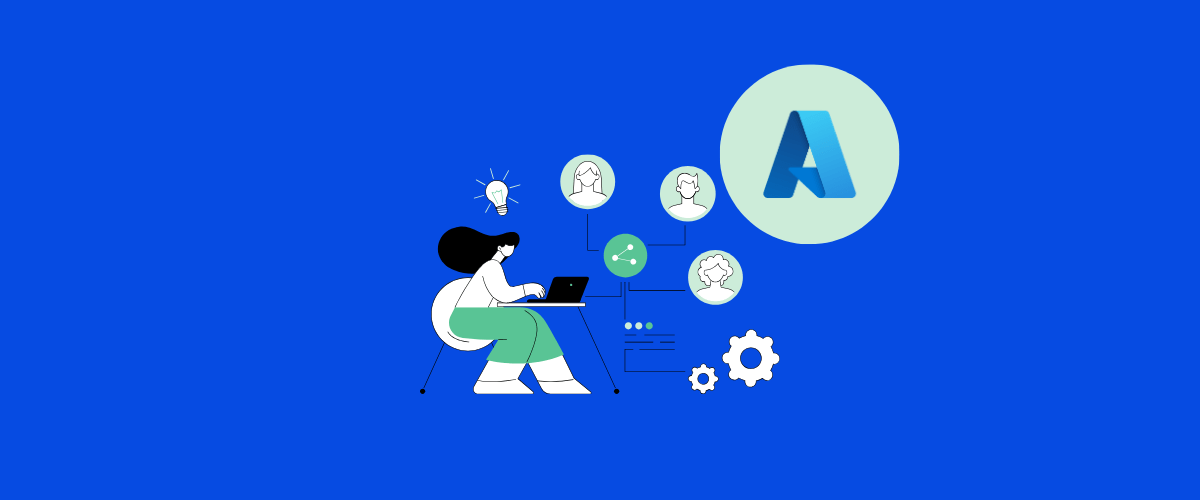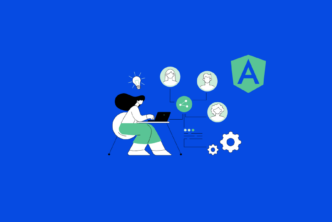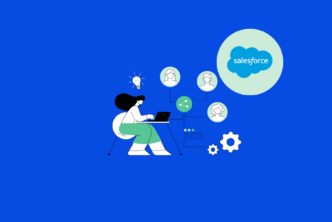Azure DevOps is changing how teams build and deliver software. It brings together tools for planning, coding, testing, and deployment. Many companies want to use Azure DevOps but don’t know where to start.

Hiring Azure DevOps experts can help businesses streamline their software development process and boost productivity. These pros know how to set up pipelines, manage code, and automate testing. They can guide teams in using Azure DevOps features to their full potential.
Finding the right Azure DevOps talent takes careful planning. We need to look for people with the right mix of technical skills and teamwork abilities. A good hire will fit into the company culture and help others learn new ways of working.
Key Takeaways
- Azure DevOps experts can improve software development speed and quality
- Look for candidates with strong technical skills and teamwork abilities
- A good hire will help the whole team adopt DevOps practices
Hire Azure DevOps Engineers with YouTeam
Table of Contents
Understanding Azure DevOps
Azure DevOps is a powerful platform that helps teams plan, develop, and deliver software projects. It offers a suite of tools for collaboration, version control, and automated workflows.
What Is Azure DevOps?
Azure DevOps is Microsoft’s cloud-based service for software development. It brings together tools and services that support the entire development lifecycle.
Azure DevOps can be used for any type of project, from small mobile apps to large enterprise systems. It works with many programming languages and platforms.
The service is flexible and can be customized to fit different team sizes and workflows. It’s designed to help teams work more efficiently and deliver high-quality software faster.
Key Features of Azure DevOps
Azure DevOps offers several key features to support software development:
- Azure Boards: For planning and tracking work items
- Azure Repos: Git repositories for version control
- Azure Pipelines: CI/CD pipelines for building and deploying code
- Azure Test Plans: Tools for manual and exploratory testing
- Azure Artifacts: Package management for code sharing
These features work together seamlessly. Teams can use all of them or pick and choose what they need.
Azure DevOps also integrates with many popular tools and services. This allows teams to use their preferred tools while still benefiting from Azure DevOps’ capabilities.
Benefits of Azure DevOps in Project Management
Azure DevOps offers many benefits for project management:
- Improved collaboration: Team members can easily share code, track work, and communicate.
- Increased visibility: Dashboards and reports provide real-time insights into project status.
- Faster delivery: Automated builds and tests help teams catch issues early and ship code faster.
- Better quality: Built-in testing tools and integration with popular testing frameworks help ensure code quality.
- Scalability: Azure DevOps can handle projects of any size, from small teams to large enterprises.
By using Azure DevOps, teams can streamline their workflows and focus on delivering value to their customers. It helps reduce manual tasks and improves efficiency throughout the development process.
Defining Your DevOps Requirements
When hiring Azure DevOps professionals, it’s crucial to clearly outline your project needs and expectations. We’ll explore how to assess your project requirements, identify key skills, and consider infrastructure needs.
Assessing Your Project Needs
Start by looking at your project’s size and complexity. Is it a small app or a large enterprise system? This will help determine the level of expertise needed.
Consider your project timeline and budget. These factors will influence the number of DevOps professionals you’ll need to hire.
Think about your development methodology. Are you using Agile, Scrum, or another approach? This will affect the DevOps practices you’ll implement.
List your specific goals for implementing DevOps. Do you want to speed up deployments, improve code quality, or enhance collaboration? Clear objectives will guide your hiring decisions.
Identifying Key Skills and Expertise
Look for Azure-specific skills when hiring DevOps professionals. Experience with Azure DevOps, Azure Pipelines, and Azure Repos is essential.
Coding skills are important. Seek candidates proficient in languages like PowerShell, Python, or C#.
Infrastructure as Code (IaC) knowledge is valuable. Familiarity with tools like Azure Resource Manager (ARM) templates or Terraform is a plus.
Container expertise is crucial. Look for experience with Docker and Kubernetes.
Automation skills are key. Candidates should be comfortable with CI/CD pipelines and automated testing.
Don’t forget soft skills. Strong communication and teamwork abilities are vital in DevOps roles.
Infrastructure and Workflow Considerations
Evaluate your current infrastructure. Are you fully in the cloud, on-premises, or using a hybrid model? This will impact your DevOps approach.
Consider your scalability needs. Will your infrastructure need to handle rapid growth or fluctuating demands?
Think about security requirements. Highly regulated industries may need specialized DevOps practices to ensure compliance.
Analyze your current development workflow. Identify bottlenecks or pain points that DevOps could address.
Consider integrating existing tools. Your DevOps hires should be able to work with your current tech stack.
Plan for monitoring and logging. Robust observability is crucial for effective DevOps practices.
The Hiring Process

Finding the right Azure DevOps professionals is key to project success. A good hiring process helps us find skilled candidates who fit our team.
Creating a Detailed Job Description
A clear job description attracts qualified candidates. We list the specific Azure DevOps skills needed for the role. This includes experience with Azure pipelines, repos, and boards.
We also outline expected duties and responsibilities. For example, managing CI/CD pipelines or optimizing build processes. Soft skills like teamwork and communication are important too.
Listing required certifications helps narrow the field. Azure DevOps Expert or Azure Developer Associate are common ones to look for.
Where to Find Azure DevOps Professionals
Online job boards are a great place to start. Sites like LinkedIn, Indeed, and Stack Overflow Jobs are popular with tech professionals.
We also use Azure-specific job sites. Microsoft’s Azure careers page often has DevOps openings. Tech conferences and meetups are good for networking too.
Employee referrals can be valuable. Our current team members might know skilled Azure DevOps pros looking for new opportunities.
Partnering with IT staffing agencies can help. They often have networks of pre-screened Azure DevOps candidates.
Screening and Interviewing Candidates
We start by reviewing resumes and portfolios. We look for relevant Azure DevOps projects and experience.
A short phone screen helps us assess basic qualifications. We ask about their Azure DevOps background and career goals.
Technical interviews come next. We use coding tests to check Azure DevOps skills. Candidates might set up a CI/CD pipeline or troubleshoot a sample project.
We also do behavioral interviews. These help us gauge how well they’ll fit our team culture. We ask about past projects and how they handled challenges.
A final interview with the hiring manager wraps things up. This is a chance to discuss the role in more detail and answer any questions.
Evaluating Technical Skills

Assessing Azure DevOps skills requires a multi-faceted approach. We’ll look at key tools, certifications, and practical tests to gauge candidates’ expertise.
Common Azure DevOps Tools and Technologies
Azure DevOps relies on several core tools. Git is crucial for version control. Candidates should know how to create branches, merge code, and resolve conflicts.
Azure Pipelines is vital for CI/CD. Look for experience with YAML pipelines and release management. Familiarity with Azure Boards for work tracking is a plus.
Azure Artifacts knowledge helps with package management. Azure Test Plans expertise is valuable for QA roles. Assess their grasp of Azure Repos for code hosting.
Power BI integration skills can be useful for reporting. Check if they’ve used Azure Monitor for app insights.
Certifications and Qualifications
Microsoft offers specific Azure DevOps certifications. The Azure DevOps Engineer Expert cert is highly respected. It covers end-to-end DevOps processes.
The Azure Administrator Associate cert is also relevant. It focuses on core Azure services and management tools.
Some candidates may have the Azure Developer Associate cert. This shows their ability to create Azure solutions.
Don’t overlook general DevOps certs like AWS DevOps Engineer or Google Cloud DevOps Engineer. These indicate broad DevOps knowledge.
Practical Assessments and Coding Challenges
Hands-on tests are key to evaluating Azure DevOps skills. Set up a sample project in Azure DevOps. Ask candidates to create a CI/CD pipeline for it.
Give them a Git scenario to resolve merge conflicts. Have them set up work items and track progress in Azure Boards.
Create a coding challenge using Azure Functions or Web Apps. Ask them to deploy it using Azure Pipelines.
Test their Azure Resource Manager (ARM) template skills. Have them create a template for a simple infrastructure setup.
Evaluate their ability to integrate testing into the pipeline. Ask them to set up automated tests in Azure Test Plans.
Onboarding and Integration

Bringing new Azure DevOps hires into the team requires careful planning and execution. We’ll explore best practices for smooth onboarding, integration strategies, and setting clear expectations.
Best Practices for Onboarding
We start by creating a detailed onboarding checklist. This helps ensure no important steps are missed. The checklist should include:
- Setting up accounts and access permissions
- Providing necessary hardware and software
- Scheduling introductory meetings with key team members
A buddy system can be very helpful. We pair new hires with experienced team members who can answer questions and offer guidance.
We also prepare a welcome package with important documents, team norms, and project overviews. This gives new hires a solid foundation to build on.
Training sessions on specific tools and processes are crucial. We schedule these throughout the first few weeks to avoid information overload.
Integrating with Existing Teams
We focus on creating a welcoming environment for new Azure DevOps hires. Team-building activities help break the ice and foster connections.
We encourage open communication from day one. Regular check-ins allow new hires to share their thoughts and concerns.
Involving new team members in ongoing projects helps them feel valued. We start with smaller tasks and gradually increase responsibilities.
We make sure to introduce new hires to stakeholders across the organization. This helps them understand how their work fits into the bigger picture.
Providing access to documentation and knowledge bases is essential. We show new hires where to find important information and how to contribute.
Setting Expectations and Goals
We believe in setting clear expectations from the start. This includes:
- Defining roles and responsibilities
- Outlining performance metrics
- Discussing career growth opportunities
We work with new hires to set achievable short-term goals. This gives them a sense of direction and accomplishment.
Regular feedback sessions are important. We schedule these to discuss progress and address any challenges.
We also explain our team’s Agile processes and how new members fit into sprints and stand-ups.
It’s crucial to be transparent about any probationary periods or performance reviews. We provide clear timelines and criteria for success.
Collaboration and Communication
Effective teamwork is crucial for Azure DevOps projects. We’ll explore key areas to build strong collaboration and communication within teams.
Maintaining Effective Communication Channels
Clear communication is vital for Azure DevOps teams. We use tools like Microsoft Teams or Slack for quick chats and updates. These platforms allow us to share files, code snippets, and screenshots easily.
For more formal communication, we rely on email and video calls. Regular team meetings help keep everyone on the same page. We make sure to set clear agendas and follow up with action items.
Documentation is another key part of our communication strategy. We use wikis and shared documents to record decisions and project details. This helps new team members get up to speed quickly.
Fostering a Collaborative Environment
Team spirit is essential for successful Azure DevOps projects. We encourage open dialogue and idea sharing among team members. This creates a positive atmosphere where everyone feels valued.
We set up pair programming sessions to boost knowledge sharing. This helps junior developers learn from more experienced team members. It also improves code quality and reduces errors.
We celebrate team achievements and milestones regularly. This boosts morale and motivates the team to keep pushing forward. We also organize team-building activities to strengthen bonds between team members.
Tools for Remote and Distributed Teams
Remote work is common in Azure DevOps teams. We use version control systems like Git to manage code changes from multiple locations. This allows seamless collaboration on projects.
Cloud-based project management tools are essential for our distributed teams. We use Azure Boards to track tasks, bugs, and feature requests. This gives everyone a clear view of project progress.
For real-time collaboration, we rely on tools like Visual Studio Live Share. This lets developers work on the same code simultaneously, regardless of location. It’s great for troubleshooting and pair programming sessions.
Cultivating a DevOps Culture
Creating a strong DevOps culture is key to success with Azure DevOps. It requires shifts in mindset, processes, and teamwork. Let’s explore the core elements of building this culture.
Principles of a DevOps Mindset
A DevOps mindset focuses on collaboration and shared goals. We break down silos between development and operations teams. This means working together from start to finish on projects.
Communication is crucial. We encourage open dialogue and information sharing across teams. This helps catch issues early and speeds up problem-solving.
Automation is another key principle. We look for ways to automate repetitive tasks. This frees up time for innovation and higher-value work.
We also embrace a “fail fast” mentality. This means trying new ideas quickly, learning from mistakes, and improving rapidly.
Continuous Learning and Improvement
In DevOps, learning never stops. We create a culture where everyone is always growing their skills.
Feedback loops are essential. We gather input from users, monitor system performance, and analyze data. This helps us make informed decisions and upgrades.
We encourage experimentation. Team members try out new tools and techniques. They share what works and what doesn’t.
Training is ongoing. We invest in workshops, courses, and certifications. This keeps our skills sharp and up-to-date with the latest Azure DevOps features.
Encouraging Ownership and Accountability
In a DevOps culture, everyone takes ownership of the product. We move away from a “not my job” mentality.
Teams are responsible for their code from development to production. This includes monitoring, troubleshooting, and maintenance.
We set clear goals and metrics. This helps teams understand what success looks like and how to measure it.
Trust is crucial. We give teams the autonomy to make decisions and solve problems. Leaders provide support and guidance, not micromanagement.
We celebrate successes and learn from failures as a team. This builds a sense of shared responsibility and pride in our work.
Performance Management

We focus on key aspects of performance management for Azure DevOps teams. This includes setting the right metrics, giving helpful feedback, and supporting career growth.
Metrics and KPIs for DevOps Teams
Measuring team performance is crucial in Azure DevOps. We use metrics like deployment frequency and lead time to track progress. These show how often we release code and how quickly we respond to changes.
Code quality metrics are also important. We look at things like test coverage and the number of bugs found after release. This helps us ensure our software is stable and reliable.
Customer satisfaction scores tell us if our work is meeting user needs. We track these through surveys and feedback forms. By watching these numbers, we can see if we’re heading in the right direction.
Regular Feedback and Performance Reviews
Ongoing feedback keeps our Azure DevOps teams on track. We hold weekly check-ins to discuss current projects and any roadblocks. This helps us address issues quickly and keep work flowing smoothly.
Quarterly reviews give a broader view of performance. We look at individual contributions and team achievements. These meetings are a chance to recognize good work and plan for improvement.
We use 360-degree feedback to get a full picture. This means getting input from peers, managers, and even customers. It helps our team members see their strengths and areas for growth from all angles.
Upskilling and Career Growth Opportunities
Continuous learning is key in the fast-paced world of Azure DevOps. We offer online courses and certifications to help our team stay current. Popular options include Azure DevOps Engineer Expert and Scrum Master certifications.
We encourage attendance at tech conferences and workshops. These events are great for learning new skills and networking with peers. Our team members often come back with fresh ideas to improve our processes.
On-the-job training is also valuable. We use pair programming and mentoring to share knowledge within the team. This hands-on approach helps newer members learn from experienced colleagues.
Legal and Compliance Considerations

Hiring Azure DevOps professionals requires careful attention to legal and regulatory matters. We’ll explore key areas to keep in mind when bringing on new team members.
Understanding Employment Laws
Employment laws vary by location and can impact hiring practices. We need to follow rules on equal opportunity, anti-discrimination, and fair pay. Job postings should avoid age, gender, or other biases.
Background checks may be needed but must follow legal guidelines. Be aware of limits on asking about criminal history in some places. Proper classification of workers as employees or contractors is crucial.
Labor laws cover things like overtime, breaks, and time off. We must comply with local, state, and federal regulations. This includes minimum wage requirements and rules on working hours.
Data Privacy and Security Standards
Azure DevOps work often involves sensitive data. We must follow data protection laws like GDPR in Europe or CCPA in California. Clear policies on data handling are essential.
Security checks for new hires may be necessary. This can include NDAs and security clearances. Training on data privacy should be part of onboarding.
Access controls are important. We need to limit who can see certain data. Regular security audits help ensure ongoing compliance. Encryption and secure coding practices are also key.
Contractual Obligations and Agreements
Contracts for Azure DevOps hires should be clear and fair. Key terms include job duties, pay, benefits, and work hours. Non-compete clauses may be used but must be reasonable.
Intellectual property rights need to be addressed. This covers who owns code and other work products. Confidentiality agreements protect company and client information.
Remote work arrangements require special consideration. We must outline expectations for availability and communication. Performance metrics and evaluation processes should be defined.
Termination clauses protect both parties. They should cover notice periods and reasons for ending employment. Dispute resolution methods can help avoid legal issues later.
Frequently Asked Questions
Azure DevOps positions involve unique skills and considerations. We’ll cover common questions about interviews, salaries, qualifications, hosting options, and remote work opportunities.
What are typical interview questions for Azure DevOps positions?
Interviewers often ask about CI/CD pipelines, source control management, and agile methodologies. They may test knowledge of Azure services, PowerShell scripting, and infrastructure as code.
Candidates should be ready to discuss past projects and how they’ve solved DevOps challenges. Technical questions might cover Git workflows, build automation, and release management strategies.
What is the average salary for an Azure DevOps engineer?
As of 2024, Azure DevOps engineers in the US earn an average of $120,000 to $150,000 per year. Entry-level positions start around $80,000, while senior roles can exceed $200,000.
Salaries vary based on location, experience, and specific skills. Cities like San Francisco and New York tend to offer higher pay due to increased living costs.
What qualifications are necessary for someone looking to be hired in an Azure DevOps role?
Most Azure DevOps positions require a bachelor’s degree in computer science or a related field. Some employers accept equivalent work experience instead.
Key technical skills include proficiency in Azure services, scripting languages, and version control systems. Certifications like Azure DevOps Engineer Expert can boost job prospects.
Soft skills such as communication, problem-solving, and teamwork are also crucial. Experience with agile methodologies and continuous improvement practices is highly valued.
How can Azure DevOps be self-hosted, if at all?
Azure DevOps Server allows organizations to self-host on their own infrastructure. This option gives more control over data and customization.
Self-hosting requires dedicated servers and ongoing maintenance. It’s suitable for companies with strict data privacy requirements or specific customization needs.
Is there a free version of Azure DevOps available for use?
Yes, Microsoft offers Azure DevOps Services with a free tier. This includes basic features for small teams or individual developers.
The free version supports up to five users and includes 1800 minutes of CI/CD pipeline time per month. It also provides unlimited private Git repositories.
What options are available for working remotely as an Azure DevOps engineer?
Many companies offer remote Azure DevOps positions. The platform’s cloud-based nature makes it well-suited for remote work.
Remote jobs may be fully remote or hybrid, combining home and office work. Some roles require occasional on-site visits for team meetings or client interactions.
Job boards like LinkedIn and Stack Overflow often list remote Azure DevOps opportunities. Freelance platforms also provide options for contract work in this field.







